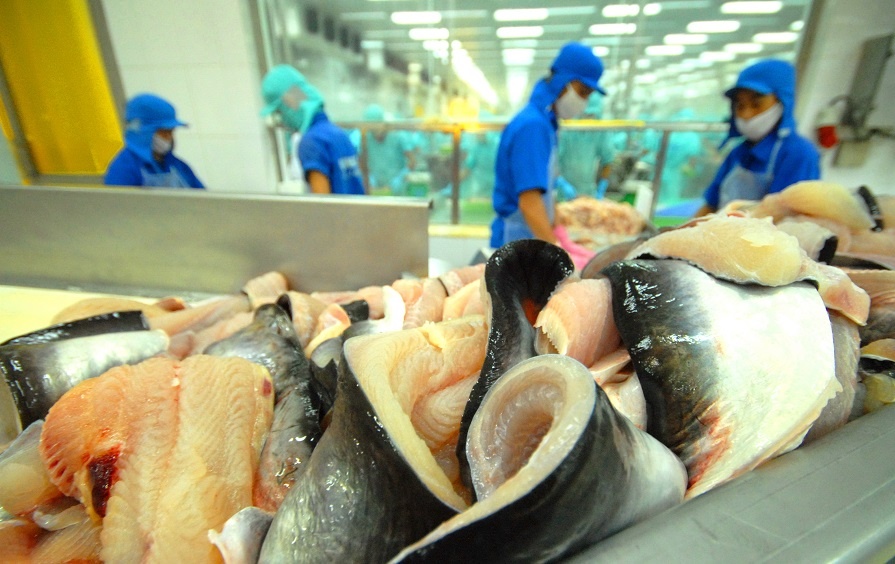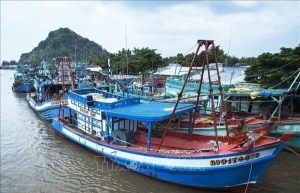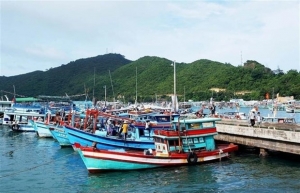New review nears on Vietnam’s unregulated fishing status
 |
| New review nears on Vietnam’s unregulated fishing status, illustration photo |
The European Commission (EC) is expected to launch its fifth inspection in April on how Vietnam has obeyed the EC’s regulations against illegal, unreported, and unregulated fishing (IUU) imposed by the EC in October 2017.
With the 2024 European Parliament election scheduled for June, it is deemed a decisive time for Vietnam to escape from the “yellow card”, boosting its seafood products to the EU market.
Authorised agencies in Vietnam have been boosting solutions to prevent IUU fishing so that the nation can ensure sustainable development in fishery and get the yellow card removed.
The Government Office over a week ago released a conclusion by Deputy Prime Minister Tran Luu Quang at the ninth meeting of the National Steering Committee on the issue. Quang ordered ministries, agencies, and leaders of 28 coastal cities and provinces to “completely solve issues and limitations surrounding IUU fishing”.
“We are determined to achieve the goal that there will be no more Vietnamese fishing vessels illegally exploiting seafood in foreign waters. We will simultaneously investigate and bring to trial cases of law violations related to brokerage and connection to bring fishing vessels and fishermen to illegally exploit foreign waters,” stated the conclusion.
So far, one case of the type has been implemented in the southern province of Kien Giang, with four people sentenced to a total of 22 years imprisonment.
The Ministry of Agriculture and Rural Development (MARD) is required to continue organising working groups to inspect and guide localities to combat IUU fishing. It has to report to the prime minister on results and propose strict handling of responsibilities of localities that fail to fulfill the tasks assigned.
The Ministry of Defence (MoD) is also tasked to work with the MARD and leaders of the 28 localities to permanently stop fishing vessels and fishermen illegally fishing in foreign waters. They have to intensify patrols, inspections, and controls in maritime areas bordering Malaysia, Indonesia, and Thailand.
The MoD has been ordered to arrange sufficient forces for maritime border posts and stations to carry out peak control of fishing vessels entering and exiting ports, while conducting patrol, inspection, and control at estuaries, estuaries, and islands. Special attention must be paid to logistics service vessels catching aquatic resources and to Kien Giang and Ca Mau provinces.
The government also required that all fishing vessels participating in aquatic exploitation must turn on vessel monitoring system (VMS) devices around the clock, from the time they leave the port to the time they return to the port. Sanctions must be imposed on all fishing vessels that violate the VMS disconnection regulations (six hours without reporting position, and not returning fishing vessels to shore for more than 10 days), and those exceeding the allowed boundary at sea.
Before the end of March, ministries, sectors, and localities must report implementation results to the MARD, which will then report to the prime minister, who is also head of the National Steering Committee on the issue.
Operators of such vessels have been warned about punishments if they violate IUU regulations, and the central government has ordered all coastal localities to take strong action plans against IUU fishing.
Vietnam is a signatory of the Food and Agriculture Organization’s Agreement on Port State Measures, which is aimed to prevent, deter, and eliminate IUU fishing through the adoption and implementation of effective measures to ensure the long-term conservation and sustainable use of living marine resources.
Meanwhile, under the EU-Vietnam Free Trade Agreement, IUU fishing is prohibited as it promotes sustainable aquaculture.
According to the Vietnam Association of Seafood Exporters and Producers, Vietnam’s total fishery export turnover hit $9.2 billion last year, down 8 per cent as compared to the initial target. This year, the figure is set to be 9.5-10 billion.
For the EU market, the figure reached $952 million last year, expected to be about the same in 2024. Under the current yellow card, all fishery containers from Vietnam into the EU are kept for examination of origin, with 2-3 days under customs clearance, inducing high costs for exporters.
Cao Thi Kim Lan, director of Binh Dinh Fishery JSC, said that since 2017, the company’s exports to the EU have been undermined, with a 70 per cent reduction in export turnover over. However, the company has still tried to abide by all regulations from the EU to keep its partners in the bloc.
Currently, Vietnam boasts over 270 ports with a total capacity of over 550 million tonnes of cargo a year.
 | Vietnam to deploy action plan to remove fishing yellow card With the right approach and modifications, Vietnam should be able to have its yellow card for unregulated fishing removed, Prime Minister Pham Minh Chinh has said. |
 | Localities fighting IUU fishing with strong determination The southern province of Ba Ria-Vung Tau will set up three inter-sectoral checkpoints at sea to supervise the operation of fishing vessels in an effort to fight illegal, unreported and unregulated (IUU) fishing. |
 | Phu Quoc ramps up efforts against IUU fishing Phu Quoc island city, along with other coastal localities in the southern province of Kien Giang, has been concertedly rolling out solutions and exerting great efforts to fight illegal, unreported and unregulated (IUU) fishing. |
What the stars mean:
★ Poor ★ ★ Promising ★★★ Good ★★★★ Very good ★★★★★ Exceptional
Related Contents
Latest News
More News
- 14th National Party Congress wraps up with success (January 25, 2026 | 09:49)
- Congratulations from VFF Central Committee's int’l partners to 14th National Party Congress (January 25, 2026 | 09:46)
- List of newly-elected members of 14th Political Bureau announced (January 23, 2026 | 16:27)
- 14th Party Central Committee unanimously elects To Lam as General Secretary (January 23, 2026 | 16:22)
- List of members of 14th Party Central Committee announced (January 23, 2026 | 09:12)
- Highlights of fourth working day of 14th National Party Congress (January 23, 2026 | 09:06)
- Press provides timely, accurate coverage of 14th National Party Congress (January 22, 2026 | 09:49)
- Press release on second working day of 14th National Party Congress (January 22, 2026 | 09:19)
- Minister sets out key directions to promote intrinsic strength of Vietnamese culture (January 22, 2026 | 09:16)
- 14th National Party Congress: Renewed momentum for OVs to contribute to homeland (January 21, 2026 | 09:49)

 Tag:
Tag:


















 Mobile Version
Mobile Version